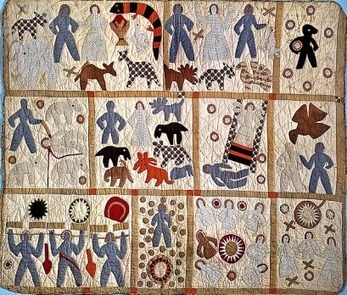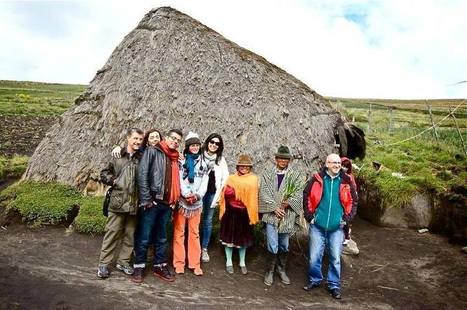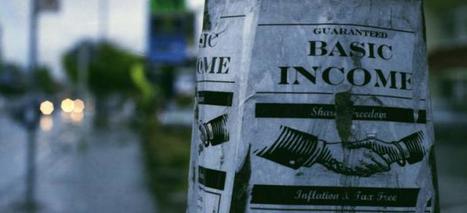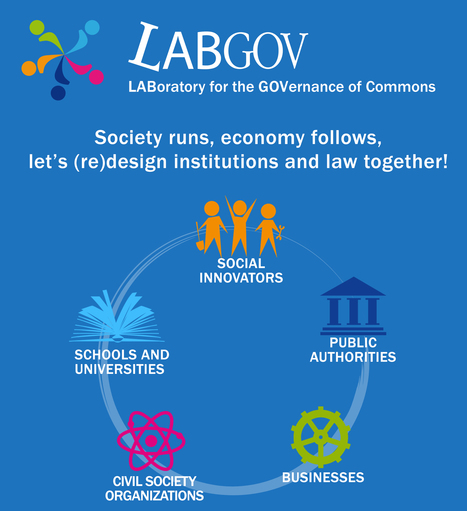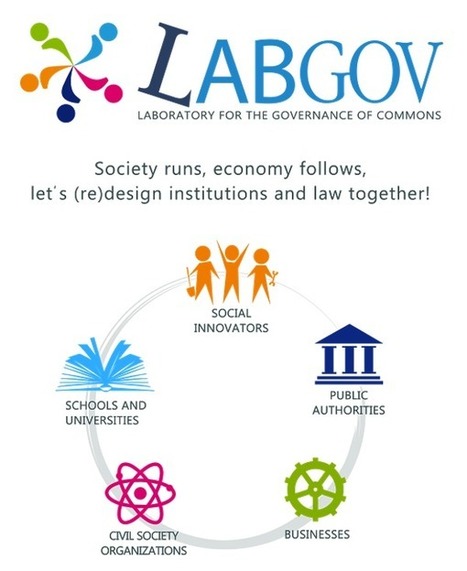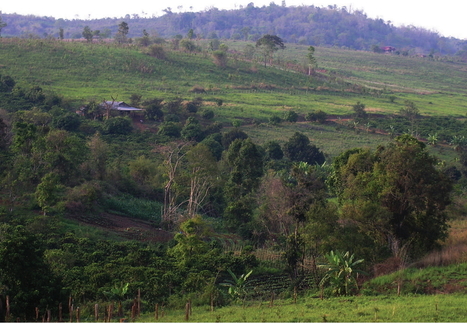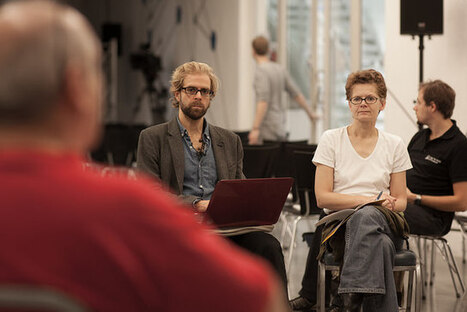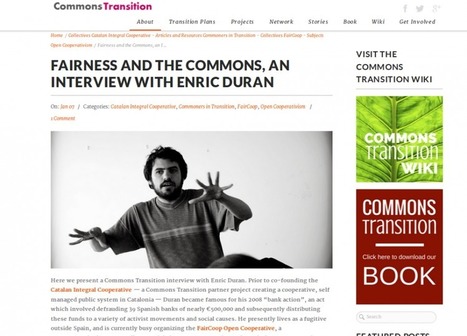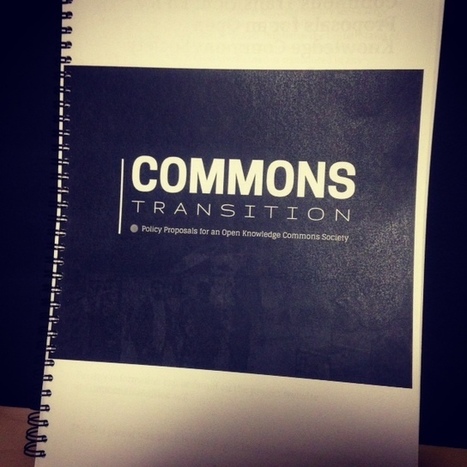 Your new post is loading...

|
Scooped by
jean lievens
May 18, 2015 12:23 PM
|
Michel Bauwens is a leading proponent of the emerging field of “peer-to-peer” (P2P) practices and theory, and the director and founder of the P2P Foundation, a global organization of researchers developing new models of peer production, governance and property.

|
Scooped by
jean lievens
May 13, 2015 6:31 PM
|
Over the past fifteen or twenty years, the monoculture narrative of IP has been attacked by a variety of cultures and users of digital technologies.

|
Scooped by
jean lievens
May 7, 2015 2:45 PM
|
“peer production and the emerging economy of the Commons may (and already do) provide the material conditions of an alternative future spirituality and self. An identity based on networks of cooperation rather than competition, and common property and sharing rather than privatization and commodification, has no need to generate a collective will that puts human systems in balance with eco-systems because that will is already built-in to the foundation of the consciousness and practices of peer production as a collective, commons project. There is no sense of the individual part standing separate from the collective whole or in a dominant relation to others, so there is no gap to mend and heal, there is only an in-built spiritual consciousness and self practice of ‘We’ and ‘I’ in nature and society as a unified (yet diverse) integral practice”

|
Scooped by
jean lievens
May 4, 2015 4:53 PM
|
I’ve been using the term “Archipelago Island Model” to describe an approach to managing local economic tools (such as credit unions, CDFIs, time banks, time networks, mutual credit variants, the gift economy) by enabling each “island” (neighbourhood, village, town, region, on-line social network, common bond, and so on … scaling in various “recursive dimensions”) to seed its own local ecosystem from tools for which it recognizes an immediate need (in some cases time banks, in others credit unions, in others LETSystems, and so on …) then gradually extending the option by adopting new tools and progressively interacting with more communities, progressively reaching further but only as far as necessary to match resources to needs. In that way efficiency and cohesion can be increased progressively while reducing emissions and resource consumption.

|
Scooped by
jean lievens
April 29, 2015 3:45 PM
|
A new collaboration between the P2P Foundation (P2PF) and the Catalan Integral Cooperative (CIC), working together on a Commons Transition Plan.

|
Scooped by
jean lievens
April 27, 2015 4:07 PM
|
The idea of bioocultural rights provides a powerful legal framework for reclaiming land, culture, traditional knowledge and self-governance.

|
Scooped by
jean lievens
April 20, 2015 12:53 PM
|
The Commons Transition Plan you are about to read is rooted in the particular experience of the FLOK project in Ecuador, which took place mainly in the first half of 2014. This was a research project commissioned by three governmental institutions in the state of Ecuador. Its intention was to help Ecuador transition to a 'social knowledge' economy and society, i.e. , a society and economy that functions as common pools of shared knowledge in every domain of social activity. However, the experience (especially the 'generic' transition plan that was proposed) largely transcends the specific situation in Ecuador.Here, we propose a version of the plan that has been changed by removing most, if not all, specific references to Ecuador.

|
Scooped by
jean lievens
April 15, 2015 4:55 PM
|
Occupy Banking: a perverse system based on debt with these institutions – who have never been voted in democratically – is hijacking our sovereignty.

|
Scooped by
jean lievens
April 8, 2015 11:02 AM
|
Commons Transition aims to re-organise society and the economy to put the Commons at the core of value creation and distribution.

|
Scooped by
jean lievens
March 26, 2015 2:42 PM
|
It’s time to broaden the debate on how to fund a universal basic income by including options for sharing resource rents, which is a model that can be applied internationally to reform unjust economic systems, reduce extreme poverty and protect the global commons.

|
Scooped by
jean lievens
March 21, 2015 3:02 AM
|
The neoliberal world-system has entered a multiple crisis, while the stalemate of the growth function is hampering the socio-economic progress.

|
Scooped by
jean lievens
March 17, 2015 1:34 PM
|
“The race to the bottom that globalization has triggered is no longer an available strategy for a knowledge economy system like Mantova. Economic actors increasingly understand that they should invest in producing collaborative value and create collaborative economic ecosystems that foster creativity, knowledge, identity, and trust.” Michel Bauwens interviews professor Christian Iaione, a facilitator of Bologna’s Regulation for the Care and Regeneration of Urban Commons. This interview was originally published in Shareable. - See more at: http://commonstransition.org/the-city-as-commons-with-professor-christian-iaione#sthash.lkqgUvil.dpuf

|
Scooped by
jean lievens
March 15, 2015 7:36 AM
|
* e-Book: Democratic Wealth: Building a Citizens’ Economy. Ed. by Stuart White, and Niki Sethi-Smith. openDemocracy and Politics in Spires, 2014 URL = http://www.scribd.com/doc/211019686/Democratic-Wealth Description “Democratic Wealth’ is a collection of essays that challenges the poverty of thinking around economic policy, particularly after the 2007 financial crash. It explores the renewed interest in republicanism …
|

|
Scooped by
jean lievens
May 16, 2015 4:14 AM
|
This presentation consists of two parts: First, with the help of a potted plant, we will attempt to illustrate the main processes and layers of commons-based peer production.

|
Scooped by
jean lievens
May 8, 2015 3:56 PM
|
Where well managed, the Commons are capable of preserving the long term health of the resources and sustained benefits to the community relying on them.

|
Scooped by
jean lievens
May 5, 2015 5:24 PM
|
What pricing is for market allocation, and decisions are for planning, mutual coordination is for commons economics. Two previous experiments, the failed Russian internet described in Francis Spufford’s Red Plenty and the Cybersin experiment described in Eden Medina’s Cybernetic Revolutionaries, failed. We have argued that commons-oriented peer production offers a unique chance to revive these practices (see here), but below, Eden Medina looks back at what went wrong in Chile, even before Pinochet destroyed the project:

|
Scooped by
jean lievens
May 4, 2015 4:50 PM
|
What pricing is for market allocation, and decisions are for planning, mutual coordination is for commons economics. Two previous experiments, the failed Russian internet described in Francis Spufford’s Red Plenty and the Cybersin experiment described in Eden Medina’s Cybernetic Revolutionaries, failed. We have argued that commons-oriented peer production offers a unique chance to revive these practices (see here), but below, Eden Medina looks back at what went wrong in Chile, even before Pinochet destroyed the project:

|
Scooped by
jean lievens
April 28, 2015 3:44 PM
|
The quick fix mindset behind geoengineering must be transformed to one that seeks a humble partnership with nature if we are to address climate change

|
Scooped by
jean lievens
April 27, 2015 4:02 PM
|

|
Scooped by
jean lievens
April 16, 2015 4:00 PM
|
The problem with this current economic model is that most of the value created is not put back into the commons.

|
Scooped by
jean lievens
April 12, 2015 1:37 PM
|

|
Scooped by
jean lievens
March 31, 2015 12:20 PM
|
I describe the crisis as the inability of our governments to protect the interests of their citizens. It is a crisis of legitimacy that is undermining the foundations of liberal democracy. Its most recent manifestation is the doctrine of austerity, and the rapid destruction of democratic civic life.

|
Scooped by
jean lievens
March 23, 2015 1:58 PM
|
In solidarity with the people of Tunis I will be attending this years Forum Social Mundial

|
Scooped by
jean lievens
March 17, 2015 4:39 PM
|
Commons Transition is a database of practical experiences and policy proposals aimed toward achieving a more humane and environmentally grounded mode of societal organization.

|
Scooped by
jean lievens
March 17, 2015 1:32 PM
|
Given that Michel Bauwens has been talking at Nesta's #futurefest this morning and we are a huge fan of his work here at the Civic Shop, today we're featuring the Commons Transition books that we have in stock.
|
 Your new post is loading...
Your new post is loading...








